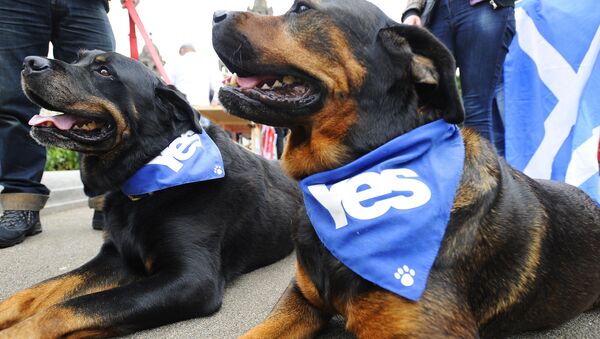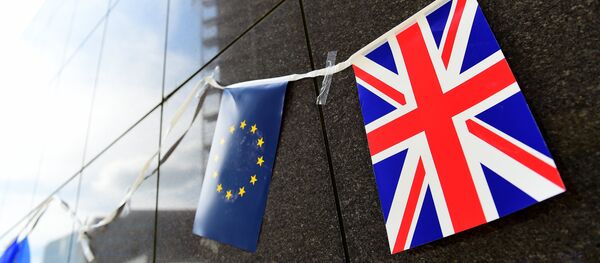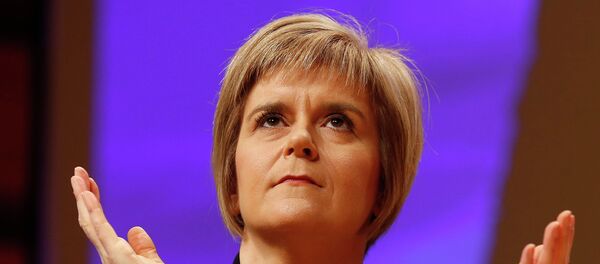Despite the apparent defeat of the independence campaign though, the country's largest pro-independence party — the SNP — look set to sweep the board, and a majority of polls put Nicola Sturgeon's party at over 50% of the vote.
With less than 48 hours till the polls open, there is little doubt that the Scottish National Party will win a third term, taking an overall majority in the Scottish Parliament.
Blimey. @Survation poll brings great news for Scottish Tories. Part I. https://t.co/nslp93wHh0 pic.twitter.com/hqVEOb8uJd
— TSE (@TSEofPB) April 21, 2016
For many in Scotland however, the interesting story of this election concerns the race for second place, which is shaping up as a close fight between the Conservative and Labour parties.
Since the late 1950's, the Labour Party dominated Scottish politics, coming in first place nationally for about 60 years. The Scottish National Party (SNP) however — under the leadership of Alex Salmond — began to eat away at that lead, culminating in the 2011 Scottish election result, wherein the SNP became the first ever party to win an overall majority in the Scottish Parliament.
That the SNP are now on course to increase their numbers is highly significant, because the probability of achieving an overall majority in the Scottish Parliament is extremely low.
Indeed, the voting system was specifically designed to make it very difficult for a single party to dominate, but the sheer popularity of the SNP has led many to suggest they have "broken the system".
Scotland's future is about to be a debate between an SNP self Government vision and a Tory continued Westminster rule. SLab will be nowhere.
— Pete Wishart (@PeteWishart) May 1, 2016
The European Question
Following the SNP's anticipated victory Thursday, all attention will likely turn towards the European question.
The EU referendum holds a special significance in Scotland, having been touted repeatedly as a potential trigger for a second independence referendum. If the UK as a whole were to vote for "Brexit" but Scotland did not, such a scenario has often been referred to as the "significant and material change in circumstances" that could allow the SNP to justify a second referendum on Scottish independence.
In case of #Brexit, Scotland would be offered fast-track membership?? pic.twitter.com/7DIyL8WpZA
— Gergely Polner (@eurocrat) April 29, 2016
The Scottish National Party under Nicola Sturgeon is not committed to holding a referendum on independence within the lifetime of the next parliament (5 years), but neither have they ruled it out.
Speaking on the BBC's Andrew Marr Show, Ms Sturgeon said:
"I want Scotland to be independent, I think it's the best future for our country so clearly I would like to see a second referendum, I would like to see Scotland be independent and I would like to see that sooner rather than later… But it's not just a decision for me, it's a decision for the majority of people in Scotland and there will only be a second referendum and there will certainly only be independence if a majority of people in Scotland want that."
Sturgeon — "UK leaving EU will be damaging."
— The Honest Man (@19AYR10) May 1, 2016
And yet she thinks Scotland leaving UK wouldn't be damaging.
What's she drinking?#Marr
Following the independence referendum defeat of 2014, huge numbers of disaffected 'Yes' voters threw their weight behind the Scottish National Party, whose membership has increased by a massive 90,000 in the intervening period, making it the third largest party in the UK.
The Labour party's reputation in Scotland has now become intrinsically linked to its involvement in the anti-independence campaign of 2014, during which it worked closely with the Conservative party. The Conservatives have long been considered a toxic brand in Scotland, commanding only a small portion of the vote for decades, and Labour's association with them has undoubtedly caused irreparable damage.
You need a sense of humour to be Scotland's only Labour MP. Luckily, @IanMurrayMP has one https://t.co/LyJpHqNccO pic.twitter.com/9jGJLGNAyz
— Kevin Schofield (@PolhomeEditor) April 30, 2016
Also hoping to make gains this Thursday are the Scottish Green Party, whose leader Patrick Harvie enjoyed a great deal of exposure during the independence referendum. Despite that, the party has struggled to capitalize on its legacy as a prominent part of the 'Yes' campaign, and doesn't look likely to increase its presence in the Scottish Parliament by a huge amount.
Likewise RISE, the new socialist party which grew out of the 'Radical Independence' movement, doesn't look likely to make much of an impression at the ballot box, despite boasting a number of high profile independence campaigners within its ranks.
.@RISE_Scotland Politics as it should be. Listening. Thinking. Talking (not ranting). pic.twitter.com/Umuefb50MM
— Allan Martin (@AllanMartin47) May 3, 2016
The Scottish Parliament Election takes place Thursday 5th May, to elect 129 members to the Scottish Parliament in Edinburgh.
It will be the fifth such election since the parliament was established in 1999, and it will also be the first Scottish election in which 16-17 year olds will be able to vote.




